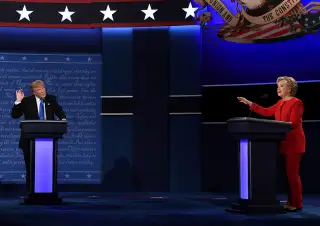At Debate, Trump and Clinton Were Miles Apart on the Economy

When it comes to the economy, presidential contenders Hillary Clinton and Donald Trump both said a lot in the first presidential debate Monday night. But for millions of struggling Americans, neither Trump's bold style nor Clinton's detailed one may have seemed totally satisfactory.
The two presidential nominees have always been a contrast in tone and temperament. And as they showed during the face-off at Hofstra University outside New York City, that’s never truer than when they are talking about your money.
As you might expect from a reality television host known for his gold-trimmed skyscrapers, Trump went big, promising to cut taxes "tremendously" and dramatically alter America's role in global trade. But as in the past, he was light on specifics. He did little to counter the verdict of among budget scorers on both sides of the aisle: His economic ideas are risky and could backfire.
His opponent, with years of experience, was far more incremental, rattling off proposals to promote clean energy and make college and child care more affordable to create "an economy that works for everyone." Yet it wasn't clear her nuanced proposals will carry the same emotional punch with voters.
Trump, seeking to persuade voters not to hand another four years of White House control to the Democrats, painted a bleak picture of the nation's economic situation, especially in manufacturing. He asserted that "jobs are fleeing our country" and blaming trade deals like the 1994 North American Free Trade Agreement, which he called "the single worst trade deal ever approved in this country."
Trump's sense that something is deeply amiss, and that America may need significant economic reforms, is what has gotten the political neophyte as far as he has – a deadlock in the polls less than two months before the election. But despite focusing heavily on international trade on Monday, he offered little beyond his business experience to explain how, as president, he could win more favorable trade terms than past negotiators.
And he missed the chance to address long-standing criticism that his plans are unlikely to bring manufacturing jobs back to the U.S, and could in fact cost the U.S. jobs. At one point, moderator Lester Holt pressed him three times to offer specifics on bringing those jobs back. Trump finally replied: "Well, the first thing you do is don't let the jobs leave."
Afterward, Trump seemed to suggest putting in place an import tariff to discourage Americans from buying foreign goods. Theoretically, taxing goods brought into the country could prompt Americans to buy more goods made here. But as widely reported, it would also hurt American exporters and, far from creating jobs, throw the economy back into a recession.
As many expected, Clinton, the former first lady, New York senator, and secretary of state, showed far more command of policy detail. If voters are looking for a steady hand at the economy's helm, Clinton likely showed she can play that role. Her problem: It's not at all clear that's what Americans are looking for.
Far from proposing to transform the economy in a fundamental way like Trump, Clinton, in State of the Union style, name-checked half a dozen economic programs sure to appeal to voters in the Democratic base — including child care and "debt free" college. She even threw in the kind of corny joke only a politician could make, dubbing Trump's plan "Trumped up trickle-down" economics to call attention to the fact that a big chuck of the proposed Trump tax cuts would go to the wealthy.
In spite of the hammy delivery, her plans dovetail far more closely with prevailing conventional wisdom than Trump's. Most economists agree the blue-collar manufacturing economy of decades past isn't coming back. They also agree today's technology-centered economy delivers big rewards to those with education. College grads earn about $17,5000 a year more than high school graduates today, according to Pew, compared to just $7,400 more in today's dollars in 1965, when Clinton and Trump were near the start of their careers.
Of course, if you are an out-of-work factory worker in your late 40s or 50s, neither Clinton's education proposal — nor others to alleviate child care costs or make America a "clean energy superpower" — are going to offer you immediate help finding a new job. On Monday night, Trump hammered her repeatedly for not fighting to get a better deal for these workers during her husband Bill Clinton's tenure in office."Why are you just thinking about these solutions right now? For thirty years, you’ve been doing it," Trump challenged.
It’s no secret that Clinton’s step-by-step approach has won over most experts. In August when The Wall Street Journal reached out to 45 economists who’d previously advised presidents of both parties, the majority of those who’d served under Democrats lined up behind Clinton. Not a single Republican was willing to endorse Trump.
What will voters think? That's the big question.